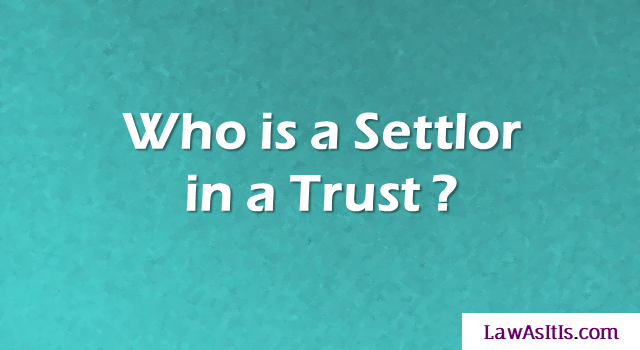Role of Settlor in a Trust. Significance of Settlor’s position. Responsibilities and contribution of a Settlor during Trust formation.
Settlor is also the Author of the Trust, the person who intends to form the Trust, who knows the reason for creation of the Trust, why the Trust is important, what purpose its formation would serve, who would manage the Trust, and most important how it would be managed.
Without the Settlor, Trust formation is impossible.

For those who are not familiar with the concept of Registration of Trust it would be worthwhile to understand that 3 entities are essential whenever a Trust is to be formed:
- Settlor – also known as the Author of the Trust
- Trustees
- Beneficiaries
Settlor is the person who intends to form the Trust for the benefit of Beneficiaries. Legally speaking, any person who is competent to enter into a contract can be a Settlor. He/She has the right to appoint the Trustees, atleast the ‘first ones’ during the formation of the Trust. Trustees of the Trust. Trustees to manage the Trust.
A Trust can have more than one Settlor (Author). For instance, 2 people or more can come together with an intention to form a Trust for a Charitable purpose, in which case such individuals can be Authiors as well as Trustees or they can identify people who are willing to carry out the objectives of the Trust as Trustees. Which means a Settlor may or may not be a Trustee in the Trust.
Incidentally, the Indian Trust Act is silent on the number of Settlors a Trust can have.
The Settlor through the Trust Deed makes it obligatory for the Trustees to obey his directions given at the time of creation of the Trust. Once the Trust is settled, the Author has no obligation or responsibility towards the Beneficiaries or the Trustees or the activities of the Trust.
The Settlor cannot be treated as representative assessee under the provisions of Income Tax Act, 1961. Hence he is not liable to discharge tax liability on the income of the Trust. Yet facts may differ from case to case. And you are therefore advised to seek an informed, considered opinion from a qualified Income Tax Expert before drawing any conclusions on Taxation vis-a-vis the Settlor, the Trust or any other entity connected therewith.
Comments
One response to “Who is a Settlor in a Trust? – Role & Significance”
In a regd. Trust Deed, the author appoints three trustees and reesrves right to appoint Chief patron. Which was later on appointed.
The trust deed stipulates certain powers of Chief Patron like every decision of Board of Trustees to have written consent of Chief Patron. The power to Chief Patron to nominate and appoint new trustees (Board of trustees not to exceed seven including FOUNDER). It further empowers Chief Patron to remove ANY TRUSTEE.
The moot point is
WHETHER AUTHOR IS TRUSTEE.
IF YES, WHETHER CHIEF PATRON CAN REMOVE AUTHOR TRUSTEE (who otherwise has appointed Chief Patron).
Please enlighten.